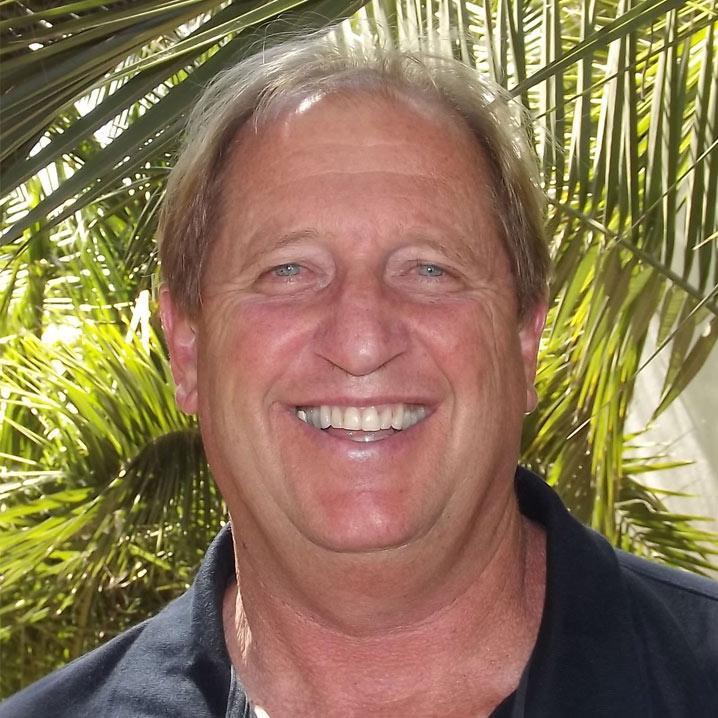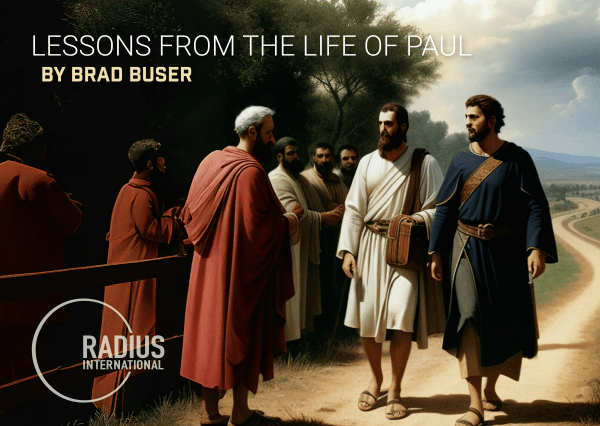Each year we walk through the books of Acts and get closely acquainted with the apostolic methods of doing church planting work. We learn much from Peter, John, Barnabas, Philip, and Stephen, but in regards to doing pioneer church planting work the Apostle Paul stands head and shoulders as the example to these Radius students. Paul didn’t pioneer everything (Peter being the first to go into a Gentile home, Cornelius’), but there is little discussion that Paul’s pioneer spirit…(Rom. 15:20), “and thus I make it my ambition to preach the, not where Christ has already been named, lest I build on someone else’s foundation,” is the model for every pioneer missionary!
Paul was clearly appointed, commissioned, and sent out by his local church. He didn’t appoint himself but was under the authority of his church in Antioch (Acts 13:2,3). Yes, even this gifted man who had received divine revelations, (II Cor. 12:1-4, Gal. 1:11,12, Eph. 3:3), understood the authority of his sending church in Antioch, and the even greater authority of the apostles based in Jerusalem. Courageous pioneer that he was, he was never a lone ranger and understood submission to the Lord via the authoritative voices of his church leadership. How much missionary folly has happened in the 21st Century as missionaries have acted on their own or created methods on their own that have never been vetted by biblically competent, local church leaders? Paul’s life speaks to us well in this area.
Paul modeled with his life that there was a time to flee (Act 14:6), and there was a time to walk courageously into the fray (Acts 14:19,20). On Paul’s first visit to Lystra after being stoned, dragged out of the city, and left for dead, how easy it would have been to make a quick retreat either back to Jerusalem, or stealthily move directly on to Derbe. He did neither. First, he returned to Lystra (for the sake of Eunice, Lois, Timothy, and others who Paul would visit on his 2nd journey?) and modeled the courage they would need. What a living example Paul was to uniquely warn these baby churches in Lystra, Iconium, and Antioch…while still wearing the marks of his stoning!! Listen to the words of Acts 14:22, “…strengthening the souls of the disciples, encouraging them to continue in the faith, and saying that through many tribulations we must enter the kingdom of God.” That first stoning would only be the beginning of a long list of sufferings Paul would endure (II Cor. 11:23-28).
Paul was able to pivot from his preferred method of starting in a synagogue. When no synagogue was apparent in the town of Philippi Paul was not above going to the banks of a river hoping to find a place of prayer and seeing in Lydia a receptive heart he shared truth with her and baptized her immediately, as he did a short time later with the jailer and his family! In Athens, he adjusted his message on the spot for those philosophical Athenians, and there was fruit (Acts 17:34) from his short time there! How different that is from many today who have only one way of communicating truth.
Paul showed a true church planter’s heart in that he was always returning to those churches he planted to encourage and strengthen them. His first trip to the area of Galatia would not be his last. Again and again, he returned and cared for them and the other baby churches he planted.
Paul was a disciple-maker as he traveled. He realized the value of team and poured himself into Barnabas (after Barnabas had previously befriended and mentored Saul), John Mark, then in Silas, (15:40) Timothy, (16:1-3) Luke, (16:10) Aquila, (18:18) Priscilla, (20:2-4) and Sopater, Aristarchus, Secundas, Gaius, Tychicus, and Trophimus. To say nothing of the personal greetings he gave to so many in the church at Rome! (Rom 16:3-16)
Paul didn’t toss friendships away over peripheral issues. The strong disagreement he and Barnabas had over John Mark (Acts 15:39) was not the end of any of those relationships. His commendation of Barnabas in I Cor. 9:10 and the value Paul put on John Mark in II Tim 4:10 show us that those rifts were not permanent. What a contrast to today’s world where missionary disagreements, rifts, and divisions commonly lead to someone, or all of them, leaving the ministry! Not in this case, each of these three continued in foreign ministry, the ministry of gospel propagation was too serious a trust to be set aside over a disagreement. The amount of missionary turnover due solely to bad relationships with other missionaries is staggering. Paul, Barnabas, and John Mark are wonderful examples in this area.
Paul didn’t get lost in the weeds regarding dress, diet, circumcision, baptism, or having a personal fan club (I Cor. 1:13-17). His laser focus on the clarity of the gospel message was sharp, courageously communicated, and vigorously defended. (Gal 1:8,9)
As a pioneer church planter, Paul spoke of orderliness in church polity, orderliness during believers’ meetings (I Cor. 14), and qualifications for elders and deacons I Tim 3:1-13. But he seems to give a degree of latitude for leading a local church. His focus was spreading the gospel and leaving healthy churches behind in those areas.
And, of course, Paul is the supreme example of finishing well (II Tim. 4:6-8). Paul didn’t retire from ministry due to weariness. Hitting 65 or 70 years of age, he didn’t fantasize about a few years at the end of his life when he could go fishing, tour the Pyramids in Egypt, or take a cruise to Alaska. We never see in Paul a man who was ‘careful not to burn out,’ as so many in ministry are counseled today.
These are only some of the lessons we glean from the life of Paul. If our Radius grads from the previous 12 years can remember these truths and stay faithful to the gospel ministry entrusted to them by their sending churches, there will be much fruitful ministry throughout their lives in the decades to come.

Brad Buser
Founder of Radius International
 We train individuals, couples, and families who are committed to long-term, pioneer church planting among unreached language groups. RADIUS students acquire spiritual, relational, emotional, and moral maturity as well as the physical stamina that will enable them to survive the rigors of cross-cultural work and life.
We train individuals, couples, and families who are committed to long-term, pioneer church planting among unreached language groups. RADIUS students acquire spiritual, relational, emotional, and moral maturity as well as the physical stamina that will enable them to survive the rigors of cross-cultural work and life.
 Do you desire to take the Gospel to those who have never heard and see a healthy church established? Apply today for our immersive training program.
Do you desire to take the Gospel to those who have never heard and see a healthy church established? Apply today for our immersive training program. Are you interested in learning first-hand about RADIUS training and whether or not it is a good fit for you or your people? Join us for RADIUS Days to see campus, sit in on classes, and interact with current students, interns, and staff.
Are you interested in learning first-hand about RADIUS training and whether or not it is a good fit for you or your people? Join us for RADIUS Days to see campus, sit in on classes, and interact with current students, interns, and staff. Come to one of our campuses in Mexico for a week-long, intensive program to serve via various campus work projects, learn more about The Great Commission, and get a taste of what our students experience during their year with us.
Come to one of our campuses in Mexico for a week-long, intensive program to serve via various campus work projects, learn more about The Great Commission, and get a taste of what our students experience during their year with us. Our friends at Missionary are hosting a conference for young adults and their leaders on June 13-14th, 2025 at NorthCreek Church in Bay Area, CA.
Our friends at Missionary are hosting a conference for young adults and their leaders on June 13-14th, 2025 at NorthCreek Church in Bay Area, CA. Join us for The Radius Conference on October 17-18th, 2025 at RAK Evangelical Church in Ras AL Khaimah, UAE.
Join us for The Radius Conference on October 17-18th, 2025 at RAK Evangelical Church in Ras AL Khaimah, UAE. Spend 9 months in Mexico and play a vital role in The Great Commission through serving our staff and students while gaining valuable cross-cultural experience and opportunities to grow in your faith.
Spend 9 months in Mexico and play a vital role in The Great Commission through serving our staff and students while gaining valuable cross-cultural experience and opportunities to grow in your faith. Would you like to join us in our efforts to further the spread of the Gospel in still-unreached places? Support the work of RADIUS International by donating online.
Would you like to join us in our efforts to further the spread of the Gospel in still-unreached places? Support the work of RADIUS International by donating online. Are you or your church interested in giving towards a special missions opportunity? Learn more about some of our current projects.
Are you or your church interested in giving towards a special missions opportunity? Learn more about some of our current projects. Partner with some of our current students by paying their tuition/room & board.
Partner with some of our current students by paying their tuition/room & board. Reimburse RADIUS for on-campus lodging and/or meals.
Reimburse RADIUS for on-campus lodging and/or meals. Check out our blog for recent posts from our staff, alumni, and ministry partners.
Check out our blog for recent posts from our staff, alumni, and ministry partners. Purchase recommended books from our online bookstore at 10ofthose.com.
Purchase recommended books from our online bookstore at 10ofthose.com.
 Do you desire to take the Gospel to those who have never heard and see a healthy church established? Do you think RADIUS might be a good fit for you? Apply today!
Do you desire to take the Gospel to those who have never heard and see a healthy church established? Do you think RADIUS might be a good fit for you? Apply today!
 Interested in working with RADIUS? Learn more about open positions.
Interested in working with RADIUS? Learn more about open positions.



